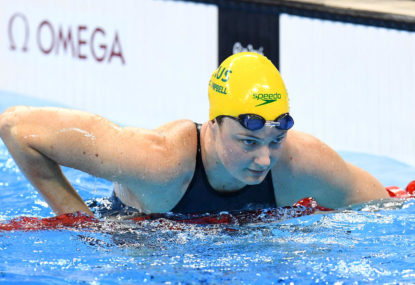'An iconic roster': LeBron, Steph, KD headline all-star cast for Team USA's shot at Olympic glory
LeBron James is going back to the Olympics for the first time in 12 years. Steph Curry is headed to the games for the…

Cate Campbell failed to win the 100 metres freestyle swimming final and awarded her effort the description of “the greatest choke in Olympic history”.
Had Campbell swam her best time she would have won.
Post-mortems and accusations will follow.
Australia’s chef de mission, Kitty Chiller, shouldn’t have set the unrealistic target of 15 to 16 gold medals. A former Olympic modern pentathlete, Chiller should have known better than putting that weight on shoulders.
Still, Campbell and the rest can be comforted by the folowing numbers: 15 to 20 gold and Australia pound-for-pound is the best sports country in the world; ten to 15 says pretty bloody good; five to ten says not bad for a little place Down Under, although less than five says a national catastrophe from which Australia may never recover.
Campbell can blame herself if she wishes, but she’s answerable to herself; not Chiller, not Australia.
And she can comfort herself in knowing she is not the only who hasn’t reached her own or her country’s expectations on one day in four years.
Stephen Holland
There were no predictions of 16 gold medals then for our Olympians at the 1976 Montreal Olympics, but there would be gold. No gold was unthinkable, unAustralian.
As it turned out, the squad returned with a handful of minor medals.
The media had virtually conceded Campbell her gold before she stepped on to the blocks in the 100m in Rio. They went further overboard for Holland in 1976.
How could he lose the 1500 metres freestyle? Holland was the smiling, 18-year-old ‘Superfish’; he’d set 12 world records, won Commonwealth and world gold. He broke his world record in the final.
What more could he do? He could have won. He had to win to save national honour.
Holland only finished third to the United States’ Brian Goodell. Only.
Afterwards, the analysis said Holland had swum a tactically bad race. Instead of his tearaway style, he’d been conservative, planning to outstay his rivals.
Broke his own world record? Not good enough. He had to win.
Holland retired straight after the Olympics. Who could blame him?
Ron Clarke
Clarke broke world records everywhere before the 1964 Tokyo Olympics, where he would surely win the 10,000 metres. It had been conceded, at least in Australia.
Clarke finished third to the United States’ Billy Mills. Failure.
He nearly died for Australia in the high altitude of the Mexico City Olympics in 1968, collapsing after running the unaccustomed marathon and being tended on the track by a stricken Dr Brian Corrigan, the team medico, after the race.
Pam Kilborn
There have been few greater Australian athletes than the versatile Kilborn, who won a swag of Commonwealth gold but only Olympics bronze and silver. Only.
Equal 80-metre hurdles world record-holder Kilborn finished third in Tokyo in 1964 after misjudging her lunge at the tape and going too early.
Fear of winning. It’s the most debilitating sporting syndrome of all.
An odds-on favourite, Kilborn finished second to little-know teammate Maureen Caird in 1968.
Australia was the beneficiary of fear of winning in 1988, when Belorussia’s Tatyana Ledovskaya became the Olympic 399.9m hurdles champion, but staggered instead of lunging at the tape, allowing Debbie Flintoff-King to become the 400m hurdles champion.
Success is relative, of course.
Triple Olympian, sprinter Melinda Gainsford was never going to win gold, but made a 200-meter final, which did justice to her talent.
Jana Novotna provides the greatest example of redemption. The Czech served for the Wimbledon women’s singles tennis title when leading 5-1 against Steffi Graf and lost.
Novotna came back to win the title, but she didn’t have to wait four years.
What price a gold medal?
The response to Montreal 1976 was the Australian Institute of Sport, associated institutes and squillions spent in pursuit of golden glory.
There’ll be similar pleas for ever more money post-Rio; there always are.
China has spent the gross national product of several small countries in pursuit of glory in Rio, and 25 gold instead of the anticipated 35 will be seen as just an acceptable pass.
The Olympics were originally about the individual, but you don’t have to go back to Berlin and 1936 to acknowledge the Olympics are now very much about nationalism.
Al the disciplines now have individual world championships. More than a handful of gold has maintained Australian pride.
Would it now be a better world without the Olympics?